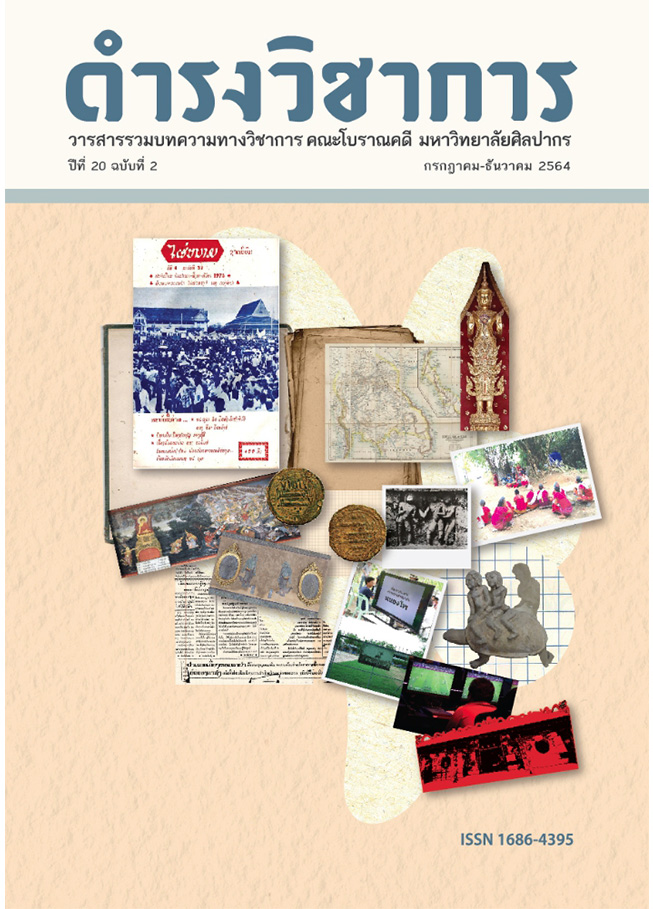From “Sien” to “Pro”: Interdependencies, Professional Players
Keywords:
E-sports, Winning, Pro-Player, Professional, Interdependencies, NetworkAbstract
This paper aims to study the professionalization of e-sports players. The focus is on events in E-League Thailand, which is the official professional e-sports association in Thailand. This paper applies ethnographic approaches, in-depth interviews with professional players, and data collected through online platforms such as video interviews and article interviews. The result reveals that the process of becoming a professional e-sports player can be divided into 5 stages: enjoying, challenging, transforming, careering, and turning-point. Furthermore, these processes are dependent on the enlarging of e-sport players’ networks and the procedures of self-control and self-image.
References
ภาษาไทย
ชาญ พนารัตน์, 2564. “บนทางสู่อารยะ: มุมมองทางสังคมวิทยาและประวัติศาสตร์ของ นอร์เบิร์ต เอไลอัส.” เอกสารอยู่ระหว่างการตีพิมพ์.
วัชรพงษ์ เขื่อนพันธ์ และ นาถนิรันดร์ จันทร์งาม, 2564. “ปัญหาทางกฎหมายเกี่ยวกับสัญญาจ้างนักกีฬาอีสปอร์ต.” Rajapark Journal 15 (38): 123-136.
ภาษาอังกฤษ
Bányai F. et al., 2020. “Career as a professional gamer: Gaming motives as predictors of career plans to become a professional Esport player.” Frontiers in Psychology 11: 1-9.
Dunning E., 1997. “Sport in the quest for excitement: Norbert Elias's contributions to the sociology of sport.” Group Analysis 30 (4): 477-487.
Elias N. & Dunning E., 2008. Quest for excitement: Sport and leisure in the civilizing process. Collected works of Norbert Elias volume 7. Dublin: University College Dublin Press.
Kim S.H. & Tomas M.K., 2015. “A stage theory model of professional video game players in South Korea: The socio-cultural dimensions of the development of expertise.” Asian Journal of Information Technology 14 (5): 176-186.
Martončik M., 2015. “e-Sports: Playing just for fun or playing to satisfy life goals?.” Computers in Human Behavior 48: 208-211.
Newton T., 1996. “Resocialising the subject? a re-reading of Grey’s ‘career as a project of the self...’.” Sociology 30 (1): 137–144. ตัด doi ออกไป
Salvador S. Reyes, Jr., 2019. “Institutionalization of esports as sports in Korea.” Master’s dissertation. Seoul National University.
Seo Y., 2015. “Professionalized consumption and identity transformations in the field of eSports.” Journal of Business Research 69 (1): 264-272.
Thiborg J., 2009. eSport and governing bodies-An outline for a research project and
preliminary results. Paper presented at Kultur-Natur Conference. Norrköping, Sweden.
Van Krieken R., 1998. Norbert Elias. London: Routledge.
Witkowski E. & Manning J., 2012. “Player power: Networked careers in esports and high-performance game livestreaming practices.” Convergence 25 (5–6): 953–969.
ข้อมูลอิเล็กทรอนิกส์
Adecco, 2019. ผลสำรวจ “อาชีพในฝันของเด็กไทย” ปี 2562. ค้นเมื่อ 3 มีนาคม 2564, จากhttps://cmu.to/VvQOx
สัมภาษณ์
Akanichi, 2562. โปรเพลย์เยอร์. สัมภาษณ์, 2 กุมภาพันธ์.
------------, 2564. โปรเพลย์เยอร์. สัมภาษณ์, 26 กรกฎาคม.
AKDragon, 2564. โปรเพลย์เยอร์. สัมภาษณ์, 20 กรกฎาคม.
MS C, 2562. ทีมอีสปอร์ต. สัมภาษณ์, 2 กุมภาพันธ์.
SeinLue, 2564. โปรเพลย์เยอร์. สัมภาษณ์, 20 กรกฎาคม.
Downloads
Published
Issue
Section
License
Copyright (c) 2021 Damrong Journal of The Faculty of Archaeology Silpakorn University

This work is licensed under a Creative Commons Attribution-NonCommercial-NoDerivatives 4.0 International License.
บทความนี้เป็นผลงานของข้าพเจ้าแต่เพียงผู้เดียว และ/หรือเป็นผลงานของข้าพเจ้าและผู้ร่วมงาน ตามชื่อที่ระบุในบทความจริง และเป็นผลงานที่มิได้ถูกนำเสนอหรือตีพิมพ์ที่ใดมาก่อน





